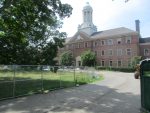September Lottery Set for Chap Crossing Affordable, Workforce Housing

Residents looking to move into the affordable and workforce housing units at Chappaqua Crossing have until early September to register and be eligible for the scheduled lottery.
The 63 Chappaqua Crossing apartments that will be open to the public in the old Reader’s Digest signature cupola building will consist of studio and one-, two- and three-bedroom apartments that are being created by Wilder Balter Properties, which signed a 99-year lease on the 1939 Georgian-style brick structure.
There will be a mix of 28 affordable units, 10 workforce apartments and 25 market-rate units. One other unit will be set aside for the building superintendent, who will live at the site.
About 130 people interested in the units attended the 75-minute informational meeting at the Chappaqua Performing Arts Center on the campus. The session was led by Rosemarie Noonan, executive director of the nonprofit Housing Action Council, and James Wendling, development manager for Wilder Balter Partners. The Housing Action Council and Wilder Balter Partners will manage the affordable and workforce apartments.
Separate lotteries will be conducted in mid-September. The deadline to sign-up to be eligible for the affordable and workforce unit lottery is Sept. 8, Noonan said. Completed application forms must be dropped off in person or mailed to the Housing Action Council, 55 S. Broadway, Tarrytown, N.Y. 10591. Application forms that are faxed or e-mailed will not be accepted, Noonan said.
Information about the lotteries as well as the market-rate units can be found at www.chappaqua-crossing-apartments.com.
Wendling said the first renters will begin moving into the apartment building in December and January.
Work to convert the building’s interior began last September and more than half complete.
The building is four stories high and will include a variety of amenities, including two gyms, a reading room, two laundries and a community room that can be rented by the building’s tenants, Wendling said. However, there will be no swimming pool at the site.
The cost of heat and hot water will be included in the rent, but tenants will pay their own electric bill. Tenants will have the option of hooking up clothes washers and dryers, Wendling noted.
Noonan said affordable housing will be based on income limits and the number of bedrooms in an apartment. For example, the lowest rent for a one-bedroom affordable unit will be $765 a month for a one-person household with a maximum annual income of $46,800 and $53,520 for a two-person family.
Income levels for workforce unit eligibility are higher than the affordable apartments, Noonan said. For a one-bedroom workforce apartment with a monthly rent of $1,810, a one-person household could have an annual income of up to $70,200 or a maximum of $80,190 for a two-person household.
Priority for workforce units will be given to New Castle town government employees, county employees, local volunteer firefighters and Chappaqua School District employees, Noonan said.
The apartment building does not set aside units specifically for seniors, she said.
Noonan said a one-month security deposit will be required of renters of the affordable and workforce units and there will be one-year leases.
Geoffrey Thompson, a spokesman for the project, said when Chappaqua Crossing is completely built will almost be a self-sustaining community. Whole Foods and Lifetime Fitness will occupy 40,000 square feet each of the 120,000 square feet of retail space. Whole Foods is being targeted for a late 2018 opening, Thompson said.
The remaining 40,000 square feet of retail will include several restaurants, a bank and a dry cleaner, among other establishments.
Furthermore, since approvals have been in place, more tenants have been moving into the 450,000 square feet of office space, Thompson said. Currently, 10 tenants are occupying the space, including Northern Westchester Hospital and CareMount. Agreements for leases for another 50,000 square feet of office space should also be secured shortly, she said.
“That leasing has certainly picked up quite a bit, now that there is certainty of what’s happening here,” Thompson said.
Chappaqua Crossing will also include 91 market-rate townhouses in what has been referred to as the campus’s east village. Fifty acres of the 114-acre site will be left as open space.
Martin Wilbur contributed to this article.
